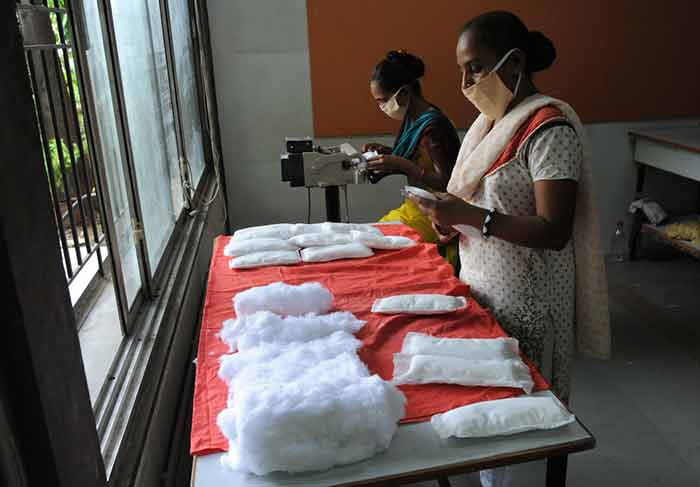
It wasn’t easy for Arunachalam Muruganantham, a simple man living in Coimbatore, Tamil Nadu to anchor the issue of menstrual hygiene, a matter which remains very private with women especially in a nation like India, to be brought into spotlight by a man.
Popularly known as the Padman of India, after the movie which was based upon his story about how he was able to pull out the near impossible from this mammoth of a job. Arunachalam’s wife, Shanthi started using waste rags and old newspapers during her menstrual cycles which brought tension to his husband. Arunachalam then looked for a solution to it and started experimenting to create a hygienic sanitary pad as he was not able to afford one.
During his initial periods of experimenting he was criticized a lot in his community as these were very sensitive things to be brought out into public by a man according to the Indian traditions in rural areas basically. But his determination and hard work paid off, when he was able to make the sanitary pad at a very lower cost.
His effort not only provided hygienic sanitary pads to his wife and members of his family but also gave employment to rural women in different parts of the nation. When exiled from his village, he contacted the Self Help Groups(SHGs) in different villages and taught them to make the pads and sell them to earn a living which provided them employment.
Arunachalam’s will, not only provided hygienic sanitary pads to the rural women who cannot afford it and use bad clothes or other unhygienic materials which are not good for their health, but also made the rural women independent as they got employment.
But not all women are lucky to have the same facility of entrepreneurship; rather they push themselves into the pain of the menstrual cycle and end-up having a dangerous disease from which it brings their health condition into a matter of concern.
According to the National Family Health Survey of 2015-16, it estimated that out of 336 million menstruating women in India only 121 million use sanitary pads locally or commercially produced which is roughly about only 36 per cent.
The issue of having a hygienic menstrual cycle is very important from the prospective of a woman’s health as denial of usage of proper sanitary pads can cause serious health problems like contracting cervical cancer, hepatitis B, reproductive tract infections and other various types of diseases.
The more horrific scene came into eyes when a study was conducted in 2016 about the menstrual hygienic management to know that how much adolescent girls knew about menstruation cycles and out of 1 lakh girls in India, 50,000 did not knew about it until they had their first period.
This created shock waves throughout the country as the report was highlighted every where and different NGOs came forward to provide support and highlight the matter so as to make the adolescent girls be aware about it.
Hygienic menstrual cycle not only prevents girls and women from various reproductive tract infection but also from other factors which come along with it; the factor of education which goes on side-by-side in the life of adolescent girls while they are on periods.
According to the report published by the NGO Dasra titled ‘Spot On!’ it mentioned that , about 23 million girls drop out from schools in India due to lack of menstrual hygienic management facilities and lack of proper sanitary pads during periods.
These statistics show us the real health problems which a women or an adolescent girl goes through during the time of her menstrual cycle.
In a nation like India these issues are being buried under the clothes in name of shame and sin. These unhealthy practices are more accepted in the rural areas of the nation. Due to lack of proper awareness about the sanitation and hygienic facilities during the menstrual cycle, women become more contagious to infectious diseases.
Arunachalam went this far as it was the matter of his wife, but that doesn’t mean that he wouldn’t have raised voice against it, but the most important thing which is the need of the time is that, this issue needs an upper hand push so as to get the rightful attention of the required audience. And in this case, the audience is the women and the adolescent girls who are going through this phase.
A 12 year old girl named Bholi, was forced to remove her uterus as she suffered from contractive reproductive tract infection. She hails from a village of Madhya Pradesh but importantly she represents that part of the population of India which suffers from various types of menstrual diseases due to lack of hygienic menstrual facilities.
For this the Govt. Of India has also provided the women with schemes like the Menstrual Hygienic Scheme(MHS) which promotes the issue and makes women and adolescent girls aware about the matter.
But India’s menstruation taboos and beliefs has crippled its own women power by setting different guidelines for them during their periods i.e. sitting outside the house, not being allowed to enter temple and others.
The systematic eradication of this matter is to make them aware about the importance of having a proper sanitation during the periods, having proper hygienic menstrual management facilities and most importantly changing the mindset and taking the problem to a larger public where its analysis and solution can be found out.
S.N.Surajbhan is an author and columnist who writes in different local and national vernaculars. He can be mailed at [email protected]
SIGN UP FOR COUNTERCURRENTS DAILY NEWS LETTER











































